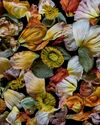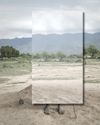
In contrast to Pakistani culture, Kalash women seem to enjoy certain freedom; they have no obligation to cover their hair, they can change spouse, and there isn't separation by sex. However, because of the concept of purity and impurity ingrained in their religion, the woman, considered impure, is relegated to being subordinated to men on the basis of her physiology. The consideration of pragata, impure, is a huge limitation of their daily mobility, from bathing and washing their clothes outside the home to having to abandon them during menstruation or childbirth to isolate themselves in the bashaleni, which is a historic patriarchal strategy that continues to prevent the empowerment of Kalash women.
Rumbur and Bumburet Valley. Pakistan
Located in the North-West Frontier Province of Pakistan, the Kalash people live in three isolated mountain valleys: Bumboret (Kalash: Mumret), Rumbur (Rukmu), and Birir (Biriu). These valleys open towards the Kunar River, some 20 km south (downstream) of Chitral.
The Kalash or Kalasha, are an ethnic group found in the Hindu Kush mountain range in the Chitral district of the North-West Frontier Province of Pakistan. Although quite numerous before the twentieth century, this non-Muslim group has been partially assimilated by the more significant Muslim majority of Pakistan and seen its numbers dwindle over the past century. Today, sheikhs, or converts to Islam, make up more than half of the total Kalasha speaking population.
This story is from the March 2022 edition of Lens Magazine.
Start your 7-day Magzter GOLD free trial to access thousands of curated premium stories, and 9,000+ magazines and newspapers.
Already a subscriber ? Sign In
This story is from the March 2022 edition of Lens Magazine.
Start your 7-day Magzter GOLD free trial to access thousands of curated premium stories, and 9,000+ magazines and newspapers.
Already a subscriber? Sign In

IN THE SHIPYARDS OF DHAKA
A very large shipyard in Dhaka is located on the Buriganga River's banks, directly across Dhaka's old city.

Aga Szydlik INDIA
A JOURNEY INTO THE LAND OF DIVERSITY, CULTURE, AND COLORS

SEBASTIAN PIÓREK EXPLORING Enjoyable LANDSCAPE
I retrieved the idea of nature closely linked to the field of human feelings.

The Extreme Macro Photography of Bees
AN INTERVIEW SAM WITH, DROEGE

JEAN KAROTKIN GYMNOPEDIES
Gymnopédies, Karotkin's ongoing series of botanical portraits, takes its name from a trio of piano compositions by 19th-century French composer Erik Satie.

BUTTERFLIES IN LOVE WITH FLOWERS
I sometimes think Chinese art is not fully appreciated in the West. I was exposed to it growing up in Australia, although my fascination was more with calligraphy.

Lissa Hahn:
Hahn: HOW TO EVOKE A PAVLOVIAN RESPONSE IN HUMANS

AN EXCLUSIVE INTERVIEW WITH ELENA PARASKEVA
Elena Paraskeva is an internationally acclaimed, award-winning Conceptual Photographer and Art Director and, most recently, an official ADOBE instructor.

From a Living Hell to Heaven on Earth: the Inhumanity and Humanity of Humans
In a remote area of western Wisconsin, dogs and cats who otherwise would have ended up on death row are given a reprieve. They can now live out their lives in peace and comfort and with companionship at Home for Life (HFL), which was not afforded them outside the sanctuary's gates.

The Art of DISAPPEARING
In the classical proposal, indigenous people are usually the topic of discussion, but rarely do they have a hand in shaping it.